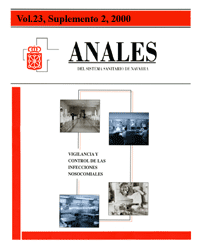Antimicrobian resistance and antibiotics policy: MRSA, GISA and VRE
Abstract
The use of antibiotics poses problems due to the difficulty in selecting the most suitable from amongst the great proliferation of existing products. This finds expression in the high percentage of unsuitable utilisation (between 31 and 65% in hospital studies), and as a result - amongst others - the appearance of bacteria for whose treatment we barely have effective antibiotics available. A review is made of the problematic concerning certain micro-organisms: Staphylococus aureus resistant to methyciline (MRSA) and with intermediate sensitivity to glycopeptides (VISA, GISA), Enterococus resistant to vancomycin (VRE), and other multiresistant germs, with details given of the actions to be taken for their prevention and control. The importance is stressed of two factors that are susceptible to modification in normal clinical practice: the unnecessary use of antibiotics that can give rise to the appearance of multiresistant strains, and limiting the propagation of such strains (by means of the adoption of standard precautions and especially hand washing).Downloads
Downloads
Published
How to Cite
Issue
Section
License
La revista Anales del Sistema Sanitario de Navarra es publicada por el Departamento de Salud del Gobierno de Navarra (España), quien conserva los derechos patrimoniales (copyright ) sobre el artículo publicado y favorece y permite la difusión del mismo bajo licencia Creative Commons Reconocimiento-CompartirIgual 4.0 Internacional (CC BY-SA 4.0). Esta licencia permite copiar, usar, difundir, transmitir y exponer públicamente el artículo, siempre que siempre que se cite la autoría y la publicación inicial en Anales del Sistema Sanitario de Navarra, y se distinga la existencia de esta licencia de uso.








